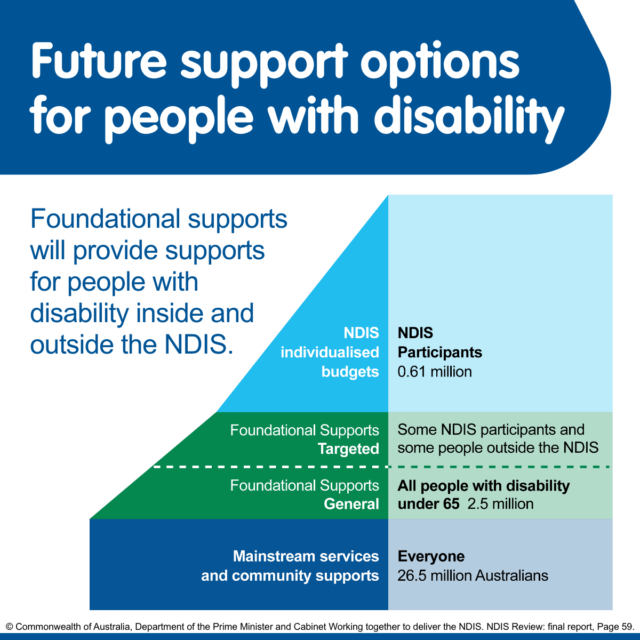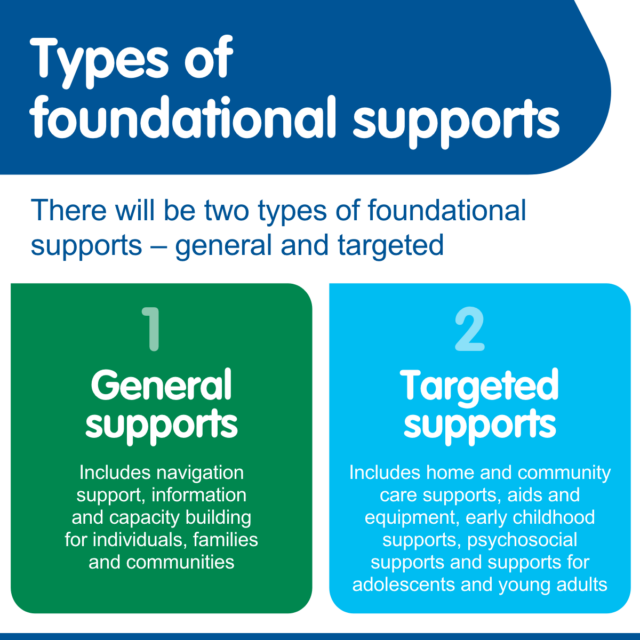The National Disability Insurance Scheme (NDIS) was established in 2013 to fund support for people with disability, with the goal of helping participants build their skills and independence to achieve their goals and participate fully in the community.
Since the NDIS began, people with disability who are not participants in the Scheme have faced difficulties accessing support, with the NDIS described as an 'oasis in the desert' or a 'lifeboat in the ocean' and the only avenue to get support.
The Independent Review of the NDIS (the Review) Final Report has recognised change is necessary to ensure all people with disability get the right support at the right time. The Review recommended developing a separate tier of disability services, called Foundational Supports, which can be accessed by all people with disability, and actions to address the lack of accessible and inclusive mainstream services, that include healthcare, education and transport.
The Review has called for a broader system of support for people with disability that would include the NDIS, foundational supports and mainstream services.

What are foundational supports?
Foundational supports are disability-specific supports that are available to all people with disability and, where appropriate, their families and carers. Foundational supports will ensure there is a graduated system of support for all people with disability and reduce the inequity between people in the NDIS and those who are not.

The NDIS Review Final Report states that there will be two types of Foundational supports - general and targeted - and the Review described them as:
"Foundational supports should include general supports available to all people with disability under the age of 65, and where appropriate, their families and carers. General supports include navigation support, information and capacity building for individuals, families and communities.
Foundational supports should also include targeted supports. These are primarily for people under the age of 65 who are not eligible for an individualised budget through the NDIS and are in most need of additional support. Targeted supports include home and community care-type supports, aids and equipment, early childhood supports, psychosocial supports and supports for adolescents and young adults."
While the Review's report noted that foundational supports are for people under the age of 65, PWDA's follow up questions lead us to understand that general foundational supports should be available to all people with disability, including people over 65 'where appropriate.' The Review intends for people over 65 to receive most of their support and care needs from the aged care system.
How will people with disability be supported to navigate the broader system of support?
People with disability, whether they are a NDIS participant or not, will be connected to a new role called a Navigator. The Navigator will be an agent for the person with disability, acting on their behalf and at their direction.
The Navigator can provide people with information about what the NDIS is and what supports may be available to them – both inside and outside the Scheme. Navigators can assist with making an access request to the NDIS and connecting people to community and mainstream services - including foundational supports.
Navigators will be based in local 'hubs' so they are knowledgeable of their local community and local foundational supports.
A Specialist Navigator will also be available for people with complex needs, and people at key life transition points - like preparing to start schooling, starting a new job, or living independently for the first time. People with psychosocial disability with high or complex needs may also be able to access a Psychosocial Recovery Navigator and people with disability with housing and living needs a Housing and Living Navigator. A Lead Practitioner will support children who are NDIS participants. Lead Practitioners may also be able to assist a child who is not an NDIS participant but has higher support needs which cannot be met by foundational supports and mainstream services.
What did the NDIS Review recommend for people with disability who are over 65?
People with disability over 65 have not been eligible for the NDIS and concerns have been raised, including by PWDA members, that they are unable to access equitable and equivalent support.
The Review proposes legislative reform that would enable NDIS participants over the age of 65 to access supports in the NDIS and aged care system at the same time. They also recommended allowing access to the NDIS for Disability Support for Older Australians Program participants.
Early indications are that general foundational supports, should be available to all people with disability, including people over 65 'where appropriate.' The Review intends for people over 65 to receive most of their support and care needs from the aged care system.
PWDA is seeking further information on how people with disability over the age of 65 will interact with the unified support system.
All governments need to work together
The delivery of foundational supports for people with disability will be driven by an agreement between all state, territory, and Australian governments, called an intergovernmental agreement (Recommendation 20).
The stage was set for this agreement when National Cabinet met on Wednesday 6 December 2023. National Cabinet, which comprises of the Prime Minister, and state and territory Premiers and Chief Ministers discussed the outcomes of the NDIS Review including the recommendation for foundational supports and agreed to "jointly design additional foundational supports to be jointly commissioned by the states and territories." Initial legislation for the changes is expected to be introduced into the Australian Parliament in early 2024.
Funding arrangements for foundational supports were also agreed, with Federal and state and territory governments agreeing to split the future costs of foundational supports 50-50, with a cap how much state and territory governments will pay.
PWDA calls for full implementation of foundational supports and uplift of mainstream and community services
PWDA welcomes the commitment from the Federal, state and territory governments to support the two principal recommendations for foundational supports through an intergovernmental agreement and investment in foundational supports.
However, state and territory governments must ensure the NDIS Review recommendations are delivered in full: all slated foundational supports must be funded, and state and territory governments can't cherry-pick what foundational supports they fund. Ensuring mainstream and community services are accessible and available to people with disability must also be a priority.
It is especially important that all supports for people with disability whether NDIS services, foundational supports and existing government services are available equally to all people with disability. This means that rural and remoteness, language and culture and other attributes should not pose any barrier to accessing support for people with disability.
We support governments being held accountable targeted key performance indicators (KPIs) which would set targets and timelines for consistent and equitable delivery of foundational supports, and community and mainstream services. This could be achieved through the Foundational Supports Strategy (action 1.2).
People with disability cannot be left stranded.
All states and territory governments must be held accountable for the nationally consistent delivery of foundational supports and for making mainstream systems fully inclusive and accessible to people with disability.
Make a suggestion
Want more information on the NDIS Review report? Fill in this form to tell us what topics you want to know more about or questions you want answered. PWDA will do our best to cover the most frequently asked questions and suggested topics in future updates, including blog articles, newsletters and social media content.
Subscribe to PWDA's newsletter
Yes






